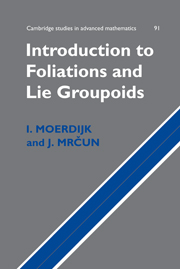3 - Two classical theorems
Published online by Cambridge University Press: 02 February 2010
Summary
In this chapter we present two milestones of the early theory of foliations, namely the theorems of Haefliger and of Novikov. Both theorems concern foliations of codimension 1 on three-dimensional manifolds.
Haefliger's theorem dates from the late 1950s, and concerns the problem of constructing codimension 1 foliations on 3-manifolds. One version asserts that if a compact three-dimensional manifold carries an analytic foliation of codimension 1, then this manifold must have infinite fundamental group. Thus, such a foliation cannot exist on the 3-sphere, for example. We will present a detailed proof, which is close to Haefliger's original argument, and which involves various notions of independent interest. The first of these is that of a Morse function into a manifold carrying a codimension 1 foliation, which we discuss in Subsection 3.1.2, after having reviewed the classical theory of Morse functions into the line. The other is that of foliations with isolated singularities on a twodimensional disk, to be discussed in Subsection 3.1.3. These singular foliations arise by pull-back along a Morse function from the disk into a given 3-manifold equipped with a codimension 1 foliation.
Novikov's theorem dates from the 1960s, and concerns the existence of compact leaves. Explicitly, it states that any (smooth) transversely orientable codimension 1 foliation of a compact manifold with finite fundamental group must have a compact leaf. Moreover, a closer analysis reveals that this compact leaf must be a torus, and that inside this torus, the given foliation looks exactly like the Reeb foliation discussed in Example 1.1 (5). We will also present a detailed proof of this result of Novikov's.
Information
- Type
- Chapter
- Information
- Introduction to Foliations and Lie Groupoids , pp. 56 - 80Publisher: Cambridge University PressPrint publication year: 2003
